
Slovenian Olympic gold medallist Janja Garnbret posted on social media on Friday appealing to the IFSC to put eating disorders and RED-S (Relative Energy Deficiency in Sport) 'on top of the agenda.'
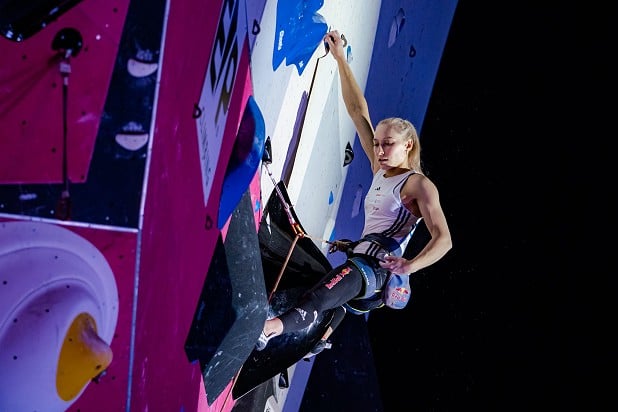
The Tokyo 2020 Olympic Champion asked 'Do we want to raise the next generation of skeletons?', repeating her question posed at an IFSC conference last year.
Garnbret's comments follow weeks of criticism and online discourse on the prevalence of underweight athletes in competition climbing and the resignation of two senior doctors on the IFSC's medical commission, who claim that the federation is not doing enough to identify and support vulnerable athletes.
Dr Eugen Burtscher, chair of the IFSC medical commission, and Dr Volker Schöffl a member of the commission, resigned from their voluntary positions earlier in July.
Dr Schöffl wrote online that despite over ten years of researching the health of climbing athletes and advising the IFSC, 'as medical doctors [they can] no longer accept the non-action of the IFSC concerning the RED-S problems of [their] athletes.'
A document outlining detailed pre-season and periodical competition screening procedures for 2024 was released by the medical commission in January. 'These measures will be implemented in 2024, in addition to what has already been in place in 2021 and 2022, and, just like the current measures, they may result in the suspension of an athlete's licence,' read an IFSC statement.
Yet athletes and medical commission experts claim that no existing measures - including body mass index (BMI) checks - have been implemented so far in the 2023 season.
According to the IOC Medical Commission, RED-S is defined as 'impaired physiological functioning caused by relative energy deficiency and includes, but is not limited to, impairments of metabolic rate, menstrual function, bone health, immunity, protein synthesis and cardiovascular health.'
The root cause of the syndrome is Low Energy Availability, when an athlete does not consume enough calories to support their energy expenditure through physical activity, leaving inadequate energy to support the functions required by the body to maintain optimal health and performance.
A number of affected athletes experience only subtle symptoms of RED-S (including but not limited to fatigue and weight loss) and are unaware of their health issues prior to diagnosis (UKC article).
RED-S and sports anorexia - an eating disorder characterised by excessive and compulsive exercise - are responsible for the highest death rate of any disease in young women, according to Dr Schöffl. 'Roughly 30% recover, 30% have a permanent eating disorder and 30% die,' he told UKC.
Among his body of research, a study by Dr Volker's team involving a self-selecting questionnaire showed that at least 16% of female climbers on the IFSC circuit have lost their periods, likely due to malnourishment. The resulting estrogen suppression can have serious implications for bone, cardiovascular and reproductive health.
But RED-S and eating disorders do not only affect women and girls, and its prevalence in climbing is nothing new.
'I have dealt with the German team and high-level professional climbers for 25 years and have had this as a constant issue throughout my whole professional career,' Dr Schöffl says.
In an early preventative measure, the IFSC made changes to the style of competition routes and boulders to indirectly encourage athletes to avoid weight-loss strategies. The shift in trend from long, endurance and finger-strength-based routes and boulders to more power-based, dynamic climbs - as recommended in the IFSC route setting guidelines - encouraged athletes to prioritise energy intake and muscle/weight gain over lightness.
'We had this concept already 15-20 years ago to make the routes more powerful in order to not have weight advantages,' Dr Schöffl explains.
It was not until around a decade ago that the IFSC began to implement occasional BMI checks, a measurement of health based on a person's weight divided by their height squared.
Throughout the 2021 competition season, the IFSC regularly screened athletes' BMI at World Cups. If an athlete's body mass index fell below the critical values for men and women (18.5 and 17.5 respectively), a letter would be sent to the relevant national federation. In August 2022, UKC asked the IFSC how many letters had been issued, but this information was not provided.
'We recommended that if an athlete's BMI is persistently too low, then they should not compete,' Dr Schöffl told UKC. 'But that's the IFSC office's call to pursue. As medical commission members, we can only advise, which we did for many, many years — unfortunately with few consequences.'
Dr Schöffl believes that his team has acquired more data on eating disorders than medics in any other sport have ever managed to record, but claims that it is not being taken seriously by the IFSC.
The IFSC issued a statement on 6 July in response to the resignations, reiterating a plan to take 'a holistic approach not based solely on BMI parameters, which alone are not sufficient to determine critical health condition' beginning from 2024.
'There is no unique tool globally which works easily,' Dr Schöffl argues. 'At present, IOC Medical Commission experts recommend using BMI, which will change in the future to body fat ultrasound measurements. Presently it is a valid screening tool, since nothing else works across five continents and different societies so easily.'
To enable more thorough assessments, Dr Schöffl and the commission recommended using BMI - and setting higher thresholds - as a filter of sorts to help identify at-risk athletes, before suggesting that they undergo a series of extensive medical tests including blood tests, body fat measurement, bone density checks, hormone level assessments and psychological screening.
A triage system would prevent 'critical' athletes from competing and refer them to immediate medical care, while others just below the threshold would be placed in an 'observation' category involving further monitoring.
A possible reason for the lack of action is the difficulty in sourcing volunteer medical staff to undertake and process such health evaluations. Currently, the IFSC Medical Commission consists primarily of volunteer medics who are attached to their respective national climbing teams at competitions.
In her post, Garnbret addressed the conflict of interest that national governing bodies, coaches and staff can hold when dealing with vulnerable athletes, rendering them unable 'to see the truth' and too dependent on an athlete's success 'to actually make the necessary calls', she said.
To minimise conflicts of interest from national federations, the IFSC Athlete Health Screening Policy and Procedures outlined by the Medical Commission and published in January recommend the formation of a panel of an Athlete Screening Personnel, consisting of a range of medical professionals, to undertake the health testing and related administrative tasks.
But the cessation of any testing or monitoring throughout this season as the Paris 2024 Olympic qualification pathway begins has caused a number of athletes, coaches and health professionals to speak out.
Olympian Alannah Yip was among the first to call out the organisation for dropping BMI testing this season and turning a blind eye to issues. 'Climbing has a cultural and systemic weight problem,' she wrote on Instagram. 'It's a dirty little non-secret that everyone knows about but no one does much about. In a sport where you are fighting gravity, weight clearly plays a role.'
As the first Olympic qualification event, the IFSC World Championships in Bern, Switzerland, starts this week, a protest campaign planned for the event involving the sale of red t-shirts with the message '@IFSC: Please take RED-S seriously!' was apparently condemned by the IFSC, who reportedly threatened the web shop creator with legal action.
Janja Garnbret wants RED-S screenings to be mandatory for all World Cup and Continental Cup participants. She continued: 'I believe that sanctions from competitions are needed if thresholds set by experts are not met.'
According to the recent IFSC statement, 'transitory measures' were also approved for the 2023 season, 'with the aim to involve National Federations monitoring their athletes.'
The IFSC added that that screening will be performed 'from this point on, under strict control of the IFSC.'
Whether any more stringent measures will be implemented at Bern and beyond - and by whom - remains to be seen.
'We, as the world governing body of Sport Climbing, feel the essential mandate to always put our athletes first, and protect them,' said IFSC President Marco Scolaris in a statement in January.
Update 8 p.m. 31 July: At the Technical Meeting tonight for the IFSC World Championships in Bern, the IFSC announced plans to undertake BMI screening before all semi-final rounds.
1 August: the IFSC have released a statement on RED-S and Athlete Health (UKC News).











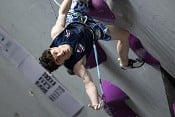
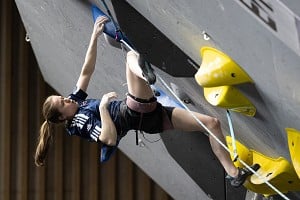
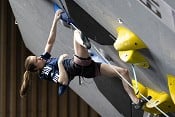

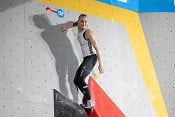
Comments
Thanks for this article keeping this important issue in the news, and to the athletes and doctors continuining to pressuring the IFSC for improvement. Being cynical, one wonders how long a President needs to be in post to have the experience to get their organisation to act appropriately on such issues.
Honestly, I'm pretty surprised it's as low as 16% with amenorrhea. I would not have been surprised to hear that this affected 50% or more. I would be quite interested to see how that compared with a percentage for finalists. Is it more of a problem for those at the very pinnacle of the competitive field? Or do these most famous athletes have fewer problems with RED-S because they have more medical professionals around them pushing back against unhealthy or dangerous training and eating regimes?
Was interesting to read that the rationale behind favouring power and dynamism rather than realistic climbing (boning down on tiny crimps) was alleged to be down to an effort to favour stronger rather than lighter athletes... I'm not entirely sure I believe that. I would have thought that a major reason for this shift was down to an effort to broaden the appeal of competition climbing as a spectator sport (you only have to look at the inclusion of speed climbing to see this is a major driver for the IFSC).
Overall I'm happy to see the IFSC being called out for not looking after their athletes health. I would have thought there was enough money in the scene by now to fund professional doctors of various flavours for this effort to protect competitors health.
It will very likely be higher than that since it was a self-selected survey and some people suffering with these issues would not necessarily want to disclose this, even in an anonymous survey (the paper acknowledges this).
New statement from the IFSC: https://www.ukclimbing.com/news/2023/08/ifsc_releases_further_statement_on_red-s_and_athlete_health-73411
Regarding the change in style, it's a bit of both I'd say. Natural progression in route setting and influence of boulder on lead resulting in the need for momentum/weight on power-based moves that are more fun to watch.
That explains a lot. I basically read the article pretty quickly and didn't look at the references at all. I habitually lie on forms where random companies ask me for info they have no use or need for under the aegis of personal data protection - I see no reason at all to trust not only the character but also the competency of someone I don't know and their entire organisation. I can only imagine how much stronger the motivation to not declare health issues is when the consequences of any kind of data leak is likely to be the suspension of your career and life passion.
Hmm... I'm not sure what you mean by "natural progression" here. To some extent I can buy into the evolution in lead route setting where, while moves have become ever more powerful and hard to read, many of the moves are still climbing moves (maybe even most of them, I've not counted). But when it comes to the bouldering, I find it hard to believe that combination dynos have taken over for any reason other than spectator enjoyment. And don't even get me started on the time limits ;)
(and yes, I'm a grumpy, old, fat, hasbeen trad climber, so don't be expecting me to move with the times!)
A common problem in sports medicine is that there is a significant conflict of interest. The medics will be employed by the team, not the athlete. As such their primary job (from their employers perspective) is to get athletes back competing as fast as possible, which doesn’t always align with keeping athletes healthy longer term. If a medic isn’t getting athletes back in action fast enough, or is giving medical advice which impacts short term results, then they are likely to get sacked. The athletes themselves also often don’t want time off or to make changes that might reduce current performance (both because of personal competitive drive and the worry that they’ll be dropped from the team if they aren’t fit). So the medics often face pressure from all angles to sacrifice athletes long term health for short term results.
E.g. Rugby has a significant problem with opiate addiction because chucking tramadol at people gets them back on the pitch faster than giving them time to rest and recover properly.
Things are slowly changing for the better I think in most sports, but ultimately athletes are often seen as a disposable commodity. If they break after a few good seasons they get dropped and replaced. Historically there hasn’t been much interest in what happens to them after that.